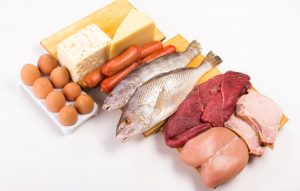 In the Zero Carb community (us folks who eat only meat, eggs, cheese and butter) there has been much controversy over whether there is a need to limit the amount of protein we eat. I have followed many Zero Carb sites for the last 2 years that I have undertaken this way of eating myself. There seems to be ample evidence that a large number of people are able to reach their desired weight and be vigorous and healthy eating all the protein they want often eating 2-3 lbs of meat per day or in some cases more with no weight gain.
In the Zero Carb community (us folks who eat only meat, eggs, cheese and butter) there has been much controversy over whether there is a need to limit the amount of protein we eat. I have followed many Zero Carb sites for the last 2 years that I have undertaken this way of eating myself. There seems to be ample evidence that a large number of people are able to reach their desired weight and be vigorous and healthy eating all the protein they want often eating 2-3 lbs of meat per day or in some cases more with no weight gain.
My own experience was that my weight loss on a program of unlimited protein consumption stalled after 4-5 months and after about 4 months of no progress I was able to restart my weight loss by initially limiting my protein. After much study the figure that seemed to be the most recommended by low carb doctors like Stephen Phinney and Eric Westman was to multiply the weight you wanted to weigh in kilograms by 1.5 and use the result as the maximum number of grams of protein you ate in a day. When I did this I was able to lose another 20 lbs before plateauing short of my goal again. The final piece to the puzzle for me was adding intermittent fasting which I won’t get into here but was the key that let me get to my ideal goal weight.
 Many people have emailed me with the problem of stalled weight loss on Zero Carb and Low Carb diets and after deciding to limit protein have subsequently gone on to lose significantly more weight after doing so.
Many people have emailed me with the problem of stalled weight loss on Zero Carb and Low Carb diets and after deciding to limit protein have subsequently gone on to lose significantly more weight after doing so.
Here is my theory as to why some people who seem to have persistent resistance to insulin cannot tolerate high protein intake while other people can seemingly eat all the protein they want as long as they stay away from the carbs (and some lucky people can even eat all the carbs they want and stay at their ideal weight).
First I think there are many forms of insulin resistance. We understand a lot about the development of insulin resistance but certainly not everything. The common thing that happens in the 60-70% of all humans that will eventually develop first the Metabolic Syndrome and eventually Diabetes with the associated complications of a high risk of heart attack, stroke, kidney failure, loss of limbs, blindness and Alzheimer’s Disease among many of the complications of this progression if they eat a high carbohydrate diet is this – “Insulin Resistance” and insulin resistance inevitably leads to higher and higher blood insulin levels making it harder and harder to get the fat in fat cells out of the cells to be burned. If you want to find out if you are insulin resistant or not click here to find out. However, 10-20% of people seem to be protected somehow and are able to eat a high carbohydrate diet without this progression. First this tells us that there is some genetic component to susceptibility to developing Insulin resistance – “We don’t all respond the same to carbs”. I personally think though I can’t find any controlled studies on this that we don’t all respond the same to protein.
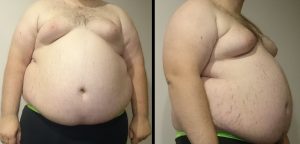 Here’s the scientific reason us insulin resistant folks can’t tolerate high protein diets. After years of excess sugar or alcohol exposure fat accumulates in the liver leading to inflammation and insulin resistance. It is at this point that people become insulin resistant and carbohydrate and protein intolerant. When the blood glucose in our bodies begins to drop a hormone called Glucagon is secreted from the pancreas. It tells the liver to start pumping out glucose. The liver has 2 ways to do this first we can store 1300-1500 calories worth of glucose in the liver in the form of Glycogen a starch that humans can make and there is another 300-500 calories worth of glycogen stored in our muscles and kidneys. When the liver receives the signal from the glucagon excreted from the Pancreas in response to low blood glucose it begins breaking down the glycogen into its component glucose molecules and dumping them into the bloodstream this is called “glycogenolysis”. The liver has another trick for upping the glucose called “gluconeogenesis” or making glucose out of the amino acids that are linked together to form the proteins in our body. Amino acids are just a modified sugar molecule, usually glucose with an ammonia (amine) group stuck to it. The liver chops off the ammonia and has enzymes that convert the remaining sugar molecule of 20 of the 22 amino acids to glucose raising your blood sugar. In people who are insulin resistant there is another malfunction in the fatty, pus filled, inflamed pancreas. When glucose levels rise when you eat carbohydrates or protein the insulin rises. Normally the pancreas senses this rise and stops producing glucagon so the liver stops churning out glucose. Unfortunately in a metabolically damaged, fatty pancreas doesn’t respond to a rise in insulin normally because it is too insulin resistant and instead stopping glucagon production often pumps out even higher levels of glucagon than normal leading to increased levles of glycolysis, gluconeogenesis and thus higher blood sugar and insulin production leading to a bad cycle. Here’s a quote from this article: “The problem is that when the beta cells give out, the alpha cells don’t give out as well. In fact, they often secrete even more glucagon than they would in a nondiabetic. Glucagon tells the liver to produce and secrete glucose, so the BG levels stay high even when you don’t eat.”
Here’s the scientific reason us insulin resistant folks can’t tolerate high protein diets. After years of excess sugar or alcohol exposure fat accumulates in the liver leading to inflammation and insulin resistance. It is at this point that people become insulin resistant and carbohydrate and protein intolerant. When the blood glucose in our bodies begins to drop a hormone called Glucagon is secreted from the pancreas. It tells the liver to start pumping out glucose. The liver has 2 ways to do this first we can store 1300-1500 calories worth of glucose in the liver in the form of Glycogen a starch that humans can make and there is another 300-500 calories worth of glycogen stored in our muscles and kidneys. When the liver receives the signal from the glucagon excreted from the Pancreas in response to low blood glucose it begins breaking down the glycogen into its component glucose molecules and dumping them into the bloodstream this is called “glycogenolysis”. The liver has another trick for upping the glucose called “gluconeogenesis” or making glucose out of the amino acids that are linked together to form the proteins in our body. Amino acids are just a modified sugar molecule, usually glucose with an ammonia (amine) group stuck to it. The liver chops off the ammonia and has enzymes that convert the remaining sugar molecule of 20 of the 22 amino acids to glucose raising your blood sugar. In people who are insulin resistant there is another malfunction in the fatty, pus filled, inflamed pancreas. When glucose levels rise when you eat carbohydrates or protein the insulin rises. Normally the pancreas senses this rise and stops producing glucagon so the liver stops churning out glucose. Unfortunately in a metabolically damaged, fatty pancreas doesn’t respond to a rise in insulin normally because it is too insulin resistant and instead stopping glucagon production often pumps out even higher levels of glucagon than normal leading to increased levles of glycolysis, gluconeogenesis and thus higher blood sugar and insulin production leading to a bad cycle. Here’s a quote from this article: “The problem is that when the beta cells give out, the alpha cells don’t give out as well. In fact, they often secrete even more glucagon than they would in a nondiabetic. Glucagon tells the liver to produce and secrete glucose, so the BG levels stay high even when you don’t eat.”
Most diabetes researchers focus on beta cells and insulin production, but some are studying the alpha cells and glucagon production as well. A recent study found that hyperglucagonemia (too much glucagon in the blood) actually precedes the decline in insulin secretion seen in diabetes.”.
Insulin resistance is caused by the same process that leads to fatty liver and fatty pancreas. Once a person is metabolically damaged like this even the 50-75% of insulin release caused by a gram of protein compared to a gram of carbohydrate keeps the insulin level too high for fat to escape the fat cells and be burned. Here are pictures of a normal pancreas and a fatty pancreas and the fat in fatty pancreas is up to 50% inflamed pus cells. 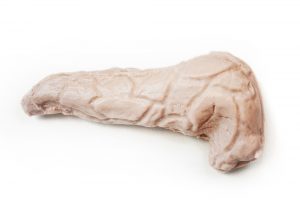
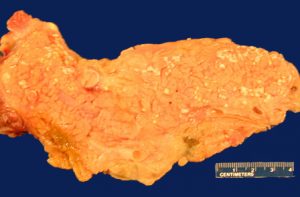
Again, I can’t find any controlled studies on weight loss on low carb diets comparing people who did and did not control the amount protein they are consuming and I doubt they exist so I am left with only anecdotal evidence. But my personal theory is that first some people are born with more insulin resistance than others. My best evidence for this is the 30-40% of people who don’t seem to become insulin resistant even on a high carb/sugar diet. And second I feel that in some people permanent damage can be done in the liver and pancreas that somehow renders them less tolerant of the insulin generated by protein consumption. I feel the group with either a high tendency to insulin resistance or residual damage to the endocrine system (liver, pancreas, spleen, kidnes etc.), a group into which I think that I fall can have problems with the lower levels of insulin release that proteins cause.
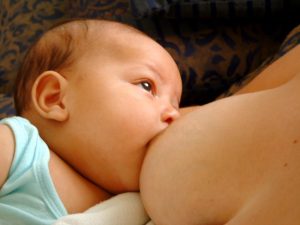 I have heard the argument that restricting protein will lead to malnutrition. I think there is good evidence to refute this claim at the level of protein I recommend. The World Health Organization recommends around 150 ml of breast milk per kilogram of weight for breastfeeding infants. The Wikipedia give the protein content of human breast milk as 1.1 grams per ml. So babies are getting 1.65 grams of protein per kg during the most rapid and demanding time of human growth. I am very comfortable personally with 1.0-1.5 grams of protein per kilogram per day as I am not in a state of rapid growth. I also think One of the “Ketodudes”, Richard Morris makes an elegant scientific argument for eating between 1.0-1.5 grams of protein per kilogram per day of protein in this video.
I have heard the argument that restricting protein will lead to malnutrition. I think there is good evidence to refute this claim at the level of protein I recommend. The World Health Organization recommends around 150 ml of breast milk per kilogram of weight for breastfeeding infants. The Wikipedia give the protein content of human breast milk as 1.1 grams per ml. So babies are getting 1.65 grams of protein per kg during the most rapid and demanding time of human growth. I am very comfortable personally with 1.0-1.5 grams of protein per kilogram per day as I am not in a state of rapid growth. I also think One of the “Ketodudes”, Richard Morris makes an elegant scientific argument for eating between 1.0-1.5 grams of protein per kilogram per day of protein in this video.
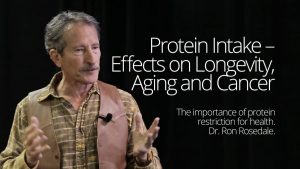 There are arguments that a high protein intake over values as low as 0.6 grams of protein per kilogram per day can hasten aging, increasing the risk of cancer and lowering immune resistance through activation of the mTOR system. Dr. Ron Rosedale is one of the main proponents of this theory. You can hear his elegant presentation of this theory here. There is a lot of experimental data on animals to support it but no controlled studies on humans so it remains an unproven theory from my perspective. Still I find the evidence strong enough to err on the lower side of protein intake.
There are arguments that a high protein intake over values as low as 0.6 grams of protein per kilogram per day can hasten aging, increasing the risk of cancer and lowering immune resistance through activation of the mTOR system. Dr. Ron Rosedale is one of the main proponents of this theory. You can hear his elegant presentation of this theory here. There is a lot of experimental data on animals to support it but no controlled studies on humans so it remains an unproven theory from my perspective. Still I find the evidence strong enough to err on the lower side of protein intake.
 My personal position is that if you’re eating 2 lbs (32 oz) of meat a day you are getting about 224 grams of protein since meat averages about 7 grams of protein per ounce. If you weigh 150 lbs (68 kg) thats 3.2 grams of protein per kg per day. If you weigh 250 lbs (113 kg), 2 lbs of meat is still 2.0 grams of protein per kg per day. So if you’re eating more than 1.5 grams of protein per kg per day and you are not losing the weight you think you need to lose to get to a desirable weight and have given it 3-6 months of an honest trial, you might consider a 1-2 month trial of limiting protein to 1.5 grams per kg of desired weight per day. Many prominent low carb doctors recommend protein restriction in this range for patients who are not losing enough weight on carb restriction only. It’s a year now since I wrote this post initially and which I updated today (4/5/18). I have now remained at my ideal weight for 21 months on a zero carb diet employing protein restriction and intermittent fasting, my health and vigor have been exceptional with no illness and even more energy and stamina than before I started protein restriction 2 years ago. I have heard from at least 40 people who have reversed their stall on Zero Carb diets by implementing protein restriction and intermittent fasting. Again if you are having great success with unlimited protein in my opinion you were either not insulin resistant or very mildly insulin resistant and were able to reverse it by eliminating carb. Since it’s working well for those folks I see no reason to change their way 0f eating. Here’s a link to how I limit protein personally.
My personal position is that if you’re eating 2 lbs (32 oz) of meat a day you are getting about 224 grams of protein since meat averages about 7 grams of protein per ounce. If you weigh 150 lbs (68 kg) thats 3.2 grams of protein per kg per day. If you weigh 250 lbs (113 kg), 2 lbs of meat is still 2.0 grams of protein per kg per day. So if you’re eating more than 1.5 grams of protein per kg per day and you are not losing the weight you think you need to lose to get to a desirable weight and have given it 3-6 months of an honest trial, you might consider a 1-2 month trial of limiting protein to 1.5 grams per kg of desired weight per day. Many prominent low carb doctors recommend protein restriction in this range for patients who are not losing enough weight on carb restriction only. It’s a year now since I wrote this post initially and which I updated today (4/5/18). I have now remained at my ideal weight for 21 months on a zero carb diet employing protein restriction and intermittent fasting, my health and vigor have been exceptional with no illness and even more energy and stamina than before I started protein restriction 2 years ago. I have heard from at least 40 people who have reversed their stall on Zero Carb diets by implementing protein restriction and intermittent fasting. Again if you are having great success with unlimited protein in my opinion you were either not insulin resistant or very mildly insulin resistant and were able to reverse it by eliminating carb. Since it’s working well for those folks I see no reason to change their way 0f eating. Here’s a link to how I limit protein personally.
I dropped from 350 to 190 using the Rosedale diet so I know it works for me.
I was sitting the front row for Dr. Rosedale’s presentation on Protein and mTOR at Low Carb Breckenridge this year. He promised to get the book he’s writing on the subject finished in 2017 to which there was applause. I definitely admire him as one of the first of the Low Carb pioneers.
If a person can only eat 1.5 kg of protein, whatelse should they eat in order to get the nurisment that is needed?
I just had the same question on Facebook. Here was my reply: You asked me about diet. I would recommend you eat 2 good size meals a day at first spaced 6-8 hours apart and take nothing with calories before and after this eating window. Since you want to weigh around 80 kg I would eat around 50-60 grams of protein at each meal in the form of fatty animal products like hot dogs, sausage, beef bologna or salami, fried eggs, 27% fat hamburger patties and ribs. Feel free to add butter to anything you like, as much as you like. Mayonnaise and mustard contain an insignificant amount of carbs and very little protein so feel free to enjoy them.
hot dogs, sausage, beef bologna and salami and 27% hamburger all contain about 4 grams of protein an ounce. One slice of bologna or salami is generally 1 ounce.
Eggs are 6 grams of protein each.
Cheese is 6 grams of protein per ounce.
You can enjoy bacon but it’s a bit of a “protein bomb” at 7 grams of protein per slice (11 grams of protein per ounce) so don’t go wild with it.
Roaster chickens from Kroger or Walmart are definitely on the diet but the meat averages 7 grams of protein per ounce (chicken doesn’t have as much fat as beef) so you can’t go crazy with it. They usually sell 2 sizes of roaster chickens, big and small. I recommend going with the small and eating no more than ½ chicken at a meal.
MacDonalds hamburger patties: the small ones have about 12 grams of protein and the ¼ pound ones 24. So 2 ½ quarter pound patties would be a meal for you. Add 6 grams of protein for each slice of cheese.
If you want to supercharge your weight loss I recommend listening to Dr. Fung’s new book “The Complete Guide to Fasting”. He has a diabetes treatment clinic in Toronto and gets 85-90% of his diabetic patients off all medication with a normal A1c and normal blood sugar readings. He call the fasting arm, “Intensive Dietary Management” and details how he uses it in the book. There are many benefits in addition to curing diabetes. Here’s a link to the audiobook.
Great post
Dr. Paul very thorough explanation we such scientific support!
How do you balance your argument with the argument against too little calories which allegedly slows metabolism? Just augment with fat to reach desired level? I started ZC four months ago, immediately lost 20 pounds and have 25 to go. Last three months I feel absolutely fine but no additional weight loss. Lately I have just been eating once a day like a late lunch. Something like 1lb of steak or burgers (all I can handle at one sitting). I know there is a calorie deficit but I don’t really get hungry at night if I eat late enough in the afternoon. Ditto for morning.
Just need to know if I am sabotaging myself in the long term.
Btw, love your blog and thank you!
I can’t recommend Dr. Jason Fung and Jimmy Moore’s book, “The Complete Guide to Fasting” enough. I the first Chapter Dr. Fung addresses misconception about fasting, citing and explaining numerous studies that disprove it. I have been eating every other day with a 6 hour window since March 6 of this year and I’ve lost 15 lbs. (I put a few back on during our move to New Mexico that I wanted to lose). I’ve noticed no loss of energy or vigor in fact I’ve noticed that I can concentrate better at tennis on fasting days and so try to play all my USTA matches in the fasting state. Improved mental clarity during fasting is something that has been documented for many centuries.
What about the probably few of us who eat zero carb, training in powerlifting and want to gain weight in muscles?
Panos, I don’t think it’s necessary unless you’re training for professional sports or the Olympics, then I’m out of my league to advise you, As so many experts say, the diet that gives you the ultimate sports performance is not necessarily the healthiest. I like to think of it as putting a turbocharger and a bottle of nitrous oxide on the engine of your car. The car is going to produce a lot more power but it’s not going to last as long as if you left it in the stock configuration because of the extra stress that’s being put on it. If you’re interested in that sort of thing, you might enjoy this interview with Long time sports performance blogger Vinnie Tortorich. https://www.youtube.com/watch?v=VEwxhSzCu6w
Thank you so much for your answer, and I’ll definitely check the stuff of Vinnie Tortorich
Don t worry too much though as gluconeogenesis is a slow process and so you ll not instantly stop burning fat if you eat a steak that s too large, or you have an extra helping of bacon on your full English breakfast.
The Insulin generated by the protein should shut down any gluconeogenesis but in people who are extremely insulin resistant, the liver doesn’t respond to the Insulin signal and continues to make sugar from the protein and to break down glycogen to glucose. This triggers even more insulin and of course while insulin is around fat cannot get out of fat cells to be burned. This can lead to a lot hunger if you did not eat enough fat with your meal that can be burned by your body. This is my opinion who some people cannot lose weight if they eat excess protein.
However don t eat large helpings of meat or eggs on a daily basis as this may set you back and stall weight loss.
Absolutely, however as I just learned from Dr. Fung’s book “The Obesity Code”, a persons weight most represents the average blood insulin levels so one important thing to consider is the Insulin Index of a food which is the amount of insulin triggered by an average serving of that food. It turns out that at an insulin index of 30, eggs have half the insulin index of fish (59) and are lower than cheese (45) and beef (51). For comparison Wholegrain bread has an insulin index of 100, potatoes (121) and baked beans (120)
Dr. Mabry I am new to all this and have not started ZC yet. I grow concerned when I read posts by people in Facebook groups that have not lost weight and who remain fat on this diet. I am 40 lbs overweight and as I get older it definitely gets harder to control – I am 50. I have tried ketogenic diets on and off again but the thing that always derails me is hunger. I get so hungry and the only thing that satisfies my hunger is meat and fat, fatty meats and meaty fat! But if I eat until my hunger is sated (even on low carb) I don’t lose weight. So I am hoping this diet will work for me. My question to you is, for someone just starting out do you recommend limiting protein? I am thinking that for the first month until I become keto-adapted or until my cravings go away I should not worry about weight and eat as much meat as it takes to satisfy my hunger. Your theory of limiting protein at some point makes sense though. Also I should note that I am sensitive to dairy and eggs and so I will be avoiding those in the beginning. I believe some people may not be losing weight because of the dairy. However, I will be drinking coffee. I am totally addicted and have never been able to quit – just two cups in the morning. Maybe I’ll be able to give that up at some point but can’t fathom it now.
Holly, you sound like you are insulin resistant like me. I have found the secret to getting into ketosis and thus being able to do intermittent fasting without hunger is getting 80% of my calories from fat. The government recommended daily allowance for protein is just 0.79 grams of protein per kilogram per day. After doing a lot of reading up to 1.5 grams of protein per kilogram per day seems the most that insulin resistant people can tolerate and lose weight and many cannot lose weight eating this much unless they also do significant intermittent fasting. My approach now is to watch the weight and for a stall of at least 2 weeks the plan would be to narrow the eating window by at least 2 hours and the protein intake by 0.1-0.2 grams/kg/day with an increase in fat intake. There shouldn’t be any hunger.
I strongly feel that aged cheese does not have the drawback attributed to dairy by many nor is it likely to trigger sensitivities. First I eat cheese aged at least 1 year. Most people who are sensitive to dairy have lactose intolerance. Aged cheese contains only trace amounts of lactose, not enough to cause a problem, the bacteria that fermented the cheese have eaten all the lactose. Second the whey proteins are poured off when the milk is curdled to make the cheese. The remaining protein is casein. But as the bacteria eat the lactose and some of the proteins that put out lactic acid which “cooks” the casein so it is much easier for the body to digest. These bacteria produce tons of Vitamin K2 (aged cheese is one of the richest sources of vitamin K2). Vitamin K2 is protective from heart attacks and strokes because it is a blood thinner preventing clots and is key in the formation of strong bones which is very important for women. As an added bonus for women, one ounce of aged cheese contains 30% of the daily recommended allowance of Calcium in a very absorbable form. The only dairy products I consume are aged cheese and butter. I can’t recommend non-fermented or partially fermented products like milk, cream, cream cheese, yougurt, ricotta cheese, or cottage cheese which I do not think have 1/100th the nutrition of aged cheese.
Holly,
Google “coffee insulin” resistance. The lower your sugar intake, the more pronounced the effect.
I hope you will be able to continue to drink coffee. You won’t NEED it on ZC; you will have plenty of natural energy. But, if you’re like me, I just loved the taste of coffee. Had to give it up though. I’ve been carnivore for more than 2 years now. And I wouldn’t go back to carbs even if I didn’t have such a problem with insulin resistance. But if I could ever figure out a way to drink my bold, bitter, black coffee with impunity, I’d snatch it up.
I drink tons of Decaf Black and have no problems with it.
I really appreciate your website and I have read your comments on the ZC forums as well. I do not know if I am significantly IR but I may have PCOS. My father has diabetes. I am at the high end of my weight range and struggle to get my weight down. I have tried Keto and ZC and struggled still with both. ZC ended up too high in protein for me while Keto still left me hungry. Fasting seems to be key for me as well. Do you recommend counting calories? Or do you recommend to just keep your protein to 1.5 g per kg desired body weight and then aim for 80%fat? I have been doing fasting-16:8 and OMAD but would consider longer as well if needed. Thanks Dr. Mabry! You are always such a gentlemen!!!
Amy my opinions are continually changing because I read lots of articles and listen to lots of scholarly lectures every week. Someone recently asked my about protein limitation and I think this reply succinctly covers my current thoughts on how insulin resistant people should eat: My views on added fat are ever evolving. Where I’m at with that now is that the answer is very different depending on whether or not you are insulin resistant and whether you need to lose weight or not. If you were ever insulin resistant (IR) I think you will always have to keep carbs less than 20 grams, limit protein to between 1.0 and 1.5 grams of protein per kilogram ideal body weight per day. Of course, this means other calories will need to come from fat. Though insulin resistance may appear to improve dramatically it’s my opinion that too much protein or carbohydrate will quickly cause the insulin resistance to return in insulin resistant people and the worse the initial insulin resistance was the quicker it will return. During the weight loss phase IR folks don’t need to add fat just eat to hunger using intermittent fasting (IF) with an eating window that’s 12 hours or shorter. My own experience is that getting 70-80% of calories from fat is the sweet spot that lets you feel full while doing IR, limiting protein and carbs and eating fewer calories than you burn which is why people on low carb high fat diets lose weight. The first thing I would do if I had any trouble with hunger doing this is to increase the percentage of calories I was getting from fat. This is not a calorie restricted diet for 2 reasons, first because on low carb high fat diets like this, the insulin levels are low so fatty acids stored in fat cells can easily leave the fat cell to be burned to make up the calorie deficit. And second, on a LCHF diet with IF one eats until satisfied during the eating window however many calories that may mean. Again my experience is that the fattier the food the harder it is to eat too many calories and the longer that hunger will be sated. On the other hand in a traditional high carb, high protein low calorie diet insulin levels are high, especially in IR folks. It’s almost impossible to get fat out of fat cells when insulin levels are high so the only thing the body can do is decrease the metabolic rate and there are also horrible hunger pains which go along with calorie restricted diets. I know I struggled to control my weight on these diets throughout my military career. Non insulin resistant folks can tolerate much higher levels of both carbohydrate and protein without great risk of obesity as long as they avoid high intakes of sugar or alcohol both of which cause insulin resistance by causing fatty liver and pancreas. I think the classic study that proves this is the fate of the “Biggest Loser” contestants who were studied before starting their calorie restricted high carbohydrate, low fat diet and then studied again six years later. The findings: almost all contestants had regained all the weight they had lost and had permanently decreased metabolic rates even if they had continued their exercise regimes. https://www.scientificamerican.com/article/6-years-after-the-biggest-loser-metabolism-is-slower-and-weight-is-back-up/
Thanks so much!
Sorry Dr Mabry, one more question. You say if one wants to lose weight or is very IR then it is not necessary to add fat, just eat to satiated in IF window, but I find that in order to hit that 70-80% mark I do need to add butter or coconut oil to my meals.
Dr. Mabry, You have added enormous clarity on what’s been happening to me since I started Zero Carb about four months ago and my weight-loss stalled after losing 18 pounds of the 40 I needed to lose. Your hypothesis, which you wisely warn us is not based on randomized controlled trials because of the dearth of research on this issue, seems applicable to me. I think I also must have been insulin resistant so long that my body now can’t tolerate more than 1.5 gm of protein per lean-body kg of weight. So beginning yesterday when I read this article, I’m keeping it at 1.5 or below as you recommend. I’m about your age and made the mistake of following the SAD for years, believe the nutritionists’ advice that it was healthy to avoid fat. I didn’t see this before reading your article, because I thought I must not be insulin resistant if I could lose 18 pounds so consistently. This most recent problem, which I now call the “Mabry protein stall” is fully explained at this point by your saying, “Though insulin resistance may appear to improve dramatically it’s my opinion that too much protein or carbohydrate will quickly cause the insulin resistance to return in insulin resistant people and the worse the initial insulin resistance was the quicker it will return.” Thank you so much for making it so clear and specific!
Dr Mabry,
Thanks for all your guidance.
I am a 66 yr old female, active, in very good health, with a prior history of IR. I went paleo 7 years ago to deal with a health crisis (successfully) and also lost a lot of weight. When I later started putting back on belly fat, I went carnivore. After 2 years on carnivore, I once again started gaining weight (I was trying to eat 2 lbs of meat/day per the ZC “recommendation”!!). Three months ago, I started IF (eating only within a 5-7 hour window) with no results. Found this post, and used the 1.5 formula. Still no results. Cut protein down to (very close to) the .6 formula. My BMI reading soon dropped from 31 to 25! But I’m still seeing almost no weight loss and no visual change in belly fat. I am eating about 150 grams of fat/day and <50 protein. Do you th8nk I'm getting too much fat? Also, I have been on an vision enhancing protocol for the last 7-10 days that includes a couple of amino acid supplements. Do you think these could be problematic? I just wwatched Dr Ron R' s presentation on mOTOr and I'm starting to wonder.
Arggh. I hate autocorrect. mTOR
I follow a Zero Carb Way of eating. There are a number of people, mainly on the Facebook Groups Zeroing in on Health and Zero Carb Health who follow a traditional way of doing Zero Carb that goes back over 30 years starting with Owsley Stanley “The Bear” (see his Wikipedia page) and feel strongly that limiting protein is harmful and will lead to health complications and further more is unsustainable. Here is a post by the Chief Moderator of Zeroing in on Health, Charles Washington who was instructed by “The Bear” and who has been eating only meat, cheese, eggs and butter for over 10 years. I actually agree with Charles on most subjects but with regard to people with stalled weight loss on traditional Zero Carb, I choose to differ for the reasons Noted in this post. I have met Charles and he is a true gentleman who has labored for 10 years with no remuneration to help people return to health by eating Zero Carb. He deserves to be heard and the above link is to his views on the subject of protein limitation. His ideas are worthy of consideration.